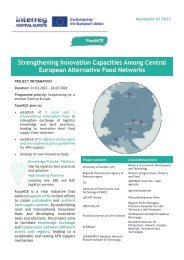The EU, the EEU, and the War in Ukraine: Political Risks and Management Options
This special issue entitled “The EU, the EEU, and the War in Ukraine: Political Risks and Management Options” is published within the framework of the Jean Monnet Network project “The EU and the EEU: Between Conflict and Competition, Convergence and Cooperation” (EUCON). The aim of this project co-funded by the Erasmus+ programme is to explore the complexity of relations between the European Union and the Eurasian Economic Union.
This special issue entitled “The EU, the EEU, and the War in Ukraine: Political Risks and Management Options” is published within the framework of the Jean Monnet Network project “The EU and the EEU: Between Conflict and Competition, Convergence and Cooperation” (EUCON). The aim of this project co-funded by the Erasmus+ programme is to explore the complexity of relations between the European Union and the Eurasian Economic Union.
- No tags were found...
Create successful ePaper yourself
Turn your PDF publications into a flip-book with our unique Google optimized e-Paper software.
Oxana Karnaukhova<br />
<strong>The</strong> new wave of transformation is characterized by remarkable features. Deepen<strong>in</strong>g <strong>in</strong>tegration<br />
<strong>and</strong> mushroom-like ris<strong>in</strong>g regional associations found MNCs as conductors <strong>and</strong> agents. <strong>The</strong><br />
dramatic <strong>in</strong>crease of technology as a strategic <strong>in</strong>dustry has changed <strong>the</strong> perception of market<br />
constra<strong>in</strong>ts, br<strong>in</strong>g<strong>in</strong>g production to a level beyond national markets. A transnational network of<br />
relations, operat<strong>in</strong>g outside states, is becom<strong>in</strong>g a modern characteristic. Markets migrate to a<br />
cyberspace mess<strong>in</strong>g up virtual <strong>and</strong> physical region of activities.<br />
<strong>The</strong>se circumstances not only raise <strong>the</strong> question of <strong>the</strong> role of <strong>the</strong> state <strong>in</strong> <strong>the</strong> world-system,<br />
but also how leadership is exercised regionally or globally. <strong>The</strong> concept of leadership (Lake<br />
1993; Kai/Skaperdas 2005) describes how a group of highly developed states predeterm<strong>in</strong>es<br />
<strong>the</strong> nature <strong>and</strong> pace of global economic development <strong>and</strong> acts as a natural ‘centre of gravity’ for<br />
develop<strong>in</strong>g economies. In a sense, regional associations are structurally composed of drivers<br />
promot<strong>in</strong>g association <strong>and</strong> weaker economies or geopolitical actors. Such centres of gravity –<br />
drivers often use patronage as a political economy tool to create a special relationship between<br />
<strong>the</strong> dom<strong>in</strong>ant <strong>and</strong> <strong>the</strong> dependent; this is usually done for cultural reasons. In o<strong>the</strong>r words,<br />
patronage as a mechanism for exercis<strong>in</strong>g leadership is a strategy for acquir<strong>in</strong>g, ma<strong>in</strong>ta<strong>in</strong><strong>in</strong>g, <strong>and</strong><br />
enhanc<strong>in</strong>g political power by patrons (Kaufman 1974). Patronage is a particular type of dyadic<br />
exchange, characterized by unequal power <strong>and</strong> status (perceived or real); a particularistic <strong>and</strong><br />
private r elationship governed by <strong>the</strong> pr<strong>in</strong>ciple of reciprocity. However, this complementarity<br />
does not necessarily mean unidirectional dom<strong>in</strong>ance. “Clients”, i.e. emerg<strong>in</strong>g economies also<br />
use this mechanism to build strategies to protect <strong>and</strong> promote <strong>the</strong>ir <strong>in</strong>terests, <strong>and</strong> <strong>the</strong>ir use is<br />
conditioned by <strong>the</strong> set of <strong>in</strong>centives <strong>and</strong> dis<strong>in</strong>centives provided to <strong>the</strong>m (Peimani 1998; Piattoni<br />
2001). As I have argued elsewhere (Karnaukhova 2022), that, s<strong>in</strong>ce patronage implies that it<br />
impr<strong>in</strong>ts on <strong>the</strong> behaviour of politicians <strong>and</strong> <strong>in</strong>fluences <strong>the</strong> way <strong>the</strong>se politicians represent <strong>the</strong>ir<br />
<strong>in</strong>terests, patron leaders use this tool by b<strong>in</strong>d<strong>in</strong>g <strong>the</strong>ir clients with strong historical <strong>and</strong> cultural<br />
ties which resist radical political transformations. As global development shows, on <strong>the</strong> one<br />
h<strong>and</strong>, <strong>the</strong> way relations between global geopolitical actors are shaped <strong>and</strong> represented depends<br />
on <strong>the</strong> strategies <strong>and</strong> <strong>in</strong>struments applied, <strong>and</strong> on <strong>the</strong> o<strong>the</strong>r h<strong>and</strong>, on <strong>the</strong> recognition of <strong>the</strong><br />
equal importance of Western <strong>and</strong> non-Western, non-European actors (Bossuyt 2019; Laruelle<br />
2021). Thus, with<strong>in</strong> <strong>the</strong> trend of regional <strong>in</strong>tegration <strong>and</strong> competition of leadership strategies, <strong>the</strong><br />
question of sovereignty, <strong>and</strong>, even more so, of economic sovereignty receives new impetus as<br />
<strong>the</strong> question of embedd<strong>in</strong>g oneself <strong>in</strong> global networks of geo-economic relations to streng<strong>the</strong>n<br />
one’s own competitiveness. With<strong>in</strong> <strong>the</strong> Westernized discourse of geoeconomic leadership,<br />
striv<strong>in</strong>g for national competitiveness <strong>and</strong> follow<strong>in</strong>g economic sovereignty does not underm<strong>in</strong>e<br />
global cooperation; on <strong>the</strong> contrary, openness promotes competitiveness. Central Asia demonstrates<br />
that <strong>the</strong> complex geopolitical context impedes <strong>the</strong> harmonious development of relations<br />
<strong>in</strong> <strong>the</strong> region.<br />
40 Wirtschaft und <strong>Management</strong> · B<strong>and</strong> 33 · März 2023















